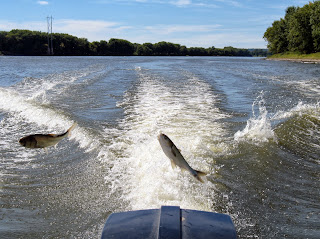“I’ve always had a love for being outdoors. Several family members of mine work in the environmental field, so that helped spark my interest in biology and environmental science. A relative of mine mentioned the IISG internship program to me last summer, but I was away at school and unavailable. I was very thankful that this internship was offered again this year as I finally got the chance to get involved with Sea Grant.
I worked with the Aquatic Invasive Species Outreach Team in Glencoe, IL. Specifically I worked with fishing tournament anglers and organizers, helping that group prevent the spread of aquatic invasive species. Anglers are a large and crucial audience when trying to reach recreational water users, as they are dependent on healthy water for fishing. However, little information was available on this audience and what they do in terms of AIS prevention. I conducted a survey with tournament organizers to better understand what their role was in AIS prevention, and I attended several fishing tournaments throughout the summer to conduct public outreach.
I’ve gained so much more experience with public outreach and education through this internship. Going to events throughout the summer has provided me with experience explaining complex environmental issues to the public. I’ve always had an interest in ecology, but this internship has really fueled an interest in aquatic ecology, especially in the Great Lakes region. The Great Lakes are an important natural resource for us, and my internship gave me an opportunity to help protect the Lakes in a meaningful way.
At this point, I want to continue working in the environmental field before going back to school for any graduate work. At the moment, I’ve just been hired to continue with IISG as an outreach assistant. I’m obviously extremely excited to stay on board with the AIS team and continue working with recreational water users as well as other audiences critical to preventing the spread of these species.”
About Newsroom
Recent News
- Coastal communities can tap into IISG resources as they manage beach sand and structures
- It’s time to apply for the 2026 IISG Graduate Scholars Program
- IISG’s Eliana Brown wins 2025 Illinois Extension Excellence Award
- We’re hiring eight interns for summer 2026
- In 2026, IISG intends to fund 10 research projects focused on coastal concerns
IISG Instagram
Graduate students: don’t miss your chance to advance your research and expand your professional network! The 2026 Illinois-Indiana Sea Grant Graduate Scholars Program is now open for applications. Whether your work focuses on coastal resiliency, Great Lakes science, water resources, or community engagement, this opportunity offers funding and professional development to support your graduate research. Learn more and apply today — opportunities like this don’t come every year!
👉 Read the full details at the link in bio.

Join us next month at the Friends of the Chicago River’s Friends of the Chicago River’s annual Student Congress. We’re excited to attend this free, student-driven environmental conference where we will be leading the Great Plankton Race.
Learn about river issues, connect with peers and professionals, enjoy snacks & giveaways, and even see live animals.
Who: Open to all students, families welcome too!
Where: On the campus of Northeastern Illinois University
When: Saturday, February 28, 2026
8:30 a.m. to 1:30 p.m.
Learn more and register at the link in bio.
#TeachingTuesday #ChicagoRiver

✨ Start Your New Year with Great Lakes Learning! ✨
Kick off 2026 by exploring the Center for Great Lakes Literacy Resource Library. It’s your one-stop hub for lesson plans, activities, and tools to bring Great Lakes science into your teaching setting.
Visit the link in bio to dive in today!
#TeachingTuesday
#GreatLakes #NewYearNewResources

Join us for a hands-on Project WET Make-and-Take Workshop in Chicago!
📅 When: March 12, 2026 from 9:00 AM – 3:30 PM CT
📍 Where: 200 S Wacker Dr., Chicago, IL
💲 Cost: $25 (includes classroom-ready activity kits, lunch & refreshments)
🗓️ Registration closes February 26.
✅ Open to 3rd–8th grade formal & informal educators
✅ Earn 6 PD hours
✅ Leave with ready-to-use water education kits aligned to Common Core & NGSS
👉 Don’t miss out—space is limited!
Learn more and register at the link in bio.
@thengrrec


